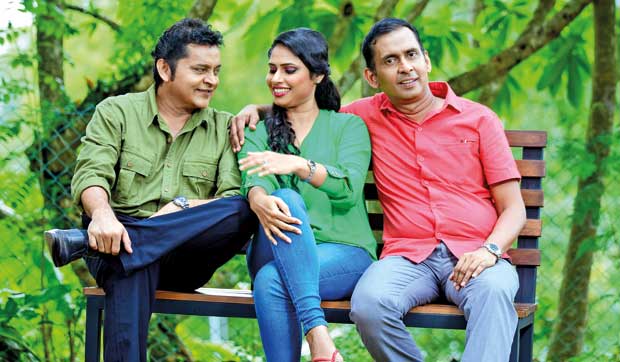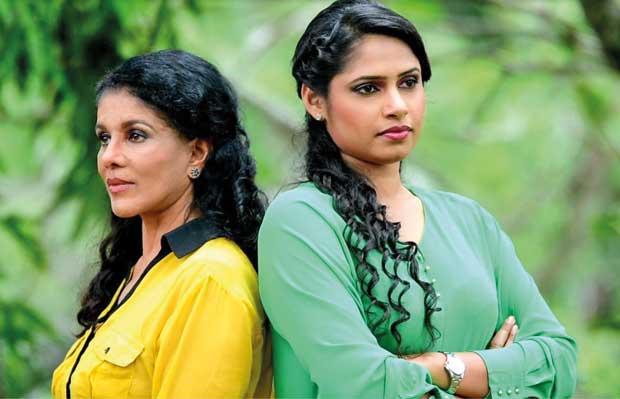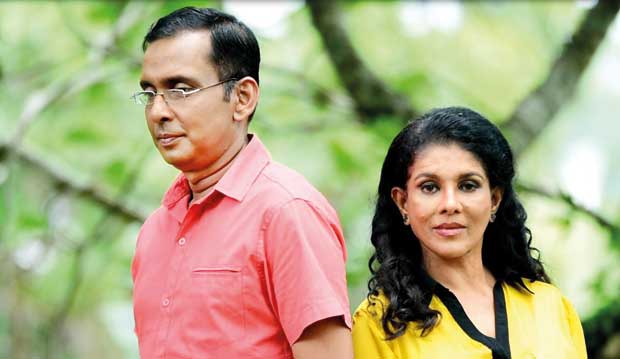02 Oct 2017 - {{hitsCtrl.values.hits}}

Nita Fernando made her name as a film star in the 1960s in popular, entertaining films such as Sathischandra Edirisinghe’s Matara Aachchi and Rajagedara Paraviyo, and moved on to more sensitive character roles in films such as Wijaya Dharmashri’s Duhulu Malak, which established her as one of our leading actresses.
She’s a prolific actress who made over 40 films in the first decade of her career. Her role as an abused domestic forced into prostitution in Hadawath Neththo remains one of her most memorable commercial cinema roles.
Her comeback after a decade spent abroad involved her mainly in the cinema, culminating in her winning an international award for her role as Violet in Prasanna Withanage’s Pauru Walalu.
But now she has opted to play the lead role in a Sinhala play – Tanuj Anawaratne’s Handa Eliyata Wedi Thiyanna (Shoot the moonlight).
If this director’s name is not familiar to today’s theatre goers, that would be because he is making a comeback after a long break, having made a name for himself at the national youth drama festival in the 1990s. This is his fourth drama. Interestingly, he and Nita Fernando have worked together before, but in the cinema, when she acted in his 2007 film Nisalagiri.
The play opens with an impressive set. Undoubtedly due to economic reasons, many Sri Lankan plays try to get by with mediocre sets, while some have actors on an almost bare stage. But the set is a very important component of the theatre. It sets the mood and is important as an introductory element to the play’s events, moods and characters.
In this play, the mood created by the set – a swinging bench to the left, a lotus-filled pond in the foreground, a bench to the right, and a doctor’s table with chair at the centre – creates an almost Chekhovian mood.

As the play got going, however, the mood became not Chekhovian but very Sri Lankan via the dialogue and acting methods. But Handa Eliyata Wedi Thiyanna tries, while working in a conventional format, a novel approach. The play opens with Jayanath Bandara (Rohan) playing a guitar and singing. There are several songs in the play, though it isn’t a musical.
This romantic, sentimental mood, however, quickly becomes harsh. The story (scripted by the director) progresses in a series of short acts without an intermission break. The mood quickly becomes confrontational. What unfolds is a story of marital infidelity involving a politically powerful family. Nita Fernando (Janaki) is the daughter of the Minister of Culture. Her husband Rohan is a director general in that Ministry. She’s older and he’s married her for her money and privileges. He is virtually a one-man cultural Police force, preaching and moralising to the public.
Neither men is qualified for his jobs. While the father at least makes an effort, the son is more interested in having a casual affair with his young Secretary Sankethi (Nadishani Peliarachchi). 
There is a secondary plot involving Rohan and Janaki’s inability to have a child. This is where Rohan’s old friend Dr. Sumith (Janaka Kumbukage) comes in.
He runs an abortion clinic. The resulting scenes between the two friends are crude. The Sinhala theatre (Like our commercial cinema) has a dependency on sexual innuendo and ‘double meanings’ to entertain the viewer.
Here, there is absolutely no need for innuendo. The language is blunt enough. Its credibility won’t be questioned if the two characters were politicians. This kind of language is common enough at these ‘higher levels’ especially when referring to women.
But in our minds, a doctor and Ministerial Secretary, however beastly they might be as men, would be wearing more refined cloaks. This is where the credibility of these two womanising characters is tested via the horrific language they use.
Rohan’s character, however, is rescued from two-dimensional oblivion by one thing. When informed by the doctor that it’s his wife who is infertile, he tells her that both share the same medical condition. This act of kindness lifts him above the ordinary. But it’s difficult to reconcile the romantic with the guitar and the completely crude character we meet in the doctor’s clinic.
All four actors give excellent performances. But the play fails to exploit the possibilities offered by the plot.

When it is found out that the mistress’ pregnancy is far too advanced to attempt an abortion, the solution offered by the doctor to his old pal is unconvincing. It is like throwing a bucket of water into a simmering fire. When the play ends, it feels as if the story has progressed only half-way.
If that plot weakness can be sorted out, Handa Eliyata Wedi Thiyanna could well be a more absorbing play.
Otherwise, via its music, set design and stage management, it achieves a level of sophistication not seen often in the Sinhala theatre nowadays.
In fact, Nita Fernando’s stage appearance and the energy she puts into this role should encourage our film actors of both sexes to work in the theatre. Many of them got their start in the theatre. Rukmani Devi, Malani Fonseka and Kaushalya Fernando come to mind, as well as Mahendra Perera and H. A. Perera. But most of them forget their cradle once they make a name in the cinema.
Veterans like W. Jayasiri and Jayalath Manoratne are equally at home in both spheres, as well as younger personalities such as Duleeka Marapana, Jagath Chamila and Sarath Kothalawala. Gamini Fonseka made a solitary appearance in the 1980s in Tony Ranasinghe’s production of Shakespeare’s Julius Caesar. The late H. A. Perera and Richard de Zoysa loved acting in both mediums.
But obviously many regard the theatre as a lot of hard work for little reward. This is sad because in the West, many film stars of international repute have worked with equal enthusiasm in both. Laurence Olivier, Russian actor Lev Durov and Yul Brynner (Russian born) are celebrated examples. Meryl Streep has played Brecht’s Mother Courage.
Hopefully, Nita Fernando’s stage appearance will encourage others too, to perform on stage.
28 Dec 2024 43 minute ago
28 Dec 2024 2 hours ago
28 Dec 2024 3 hours ago
27 Dec 2024 27 Dec 2024
27 Dec 2024 27 Dec 2024